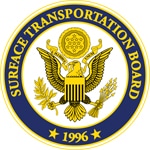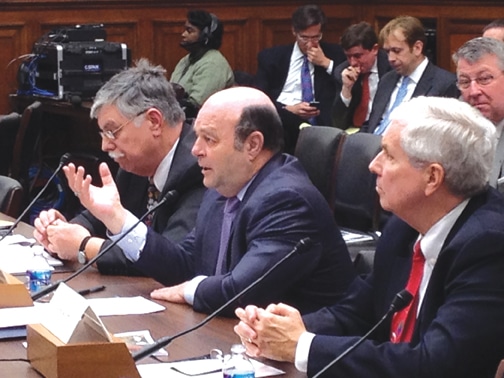WASHINGTON — Two House Republicans with transportation oversight authority — House Transportation & Infrastructure Committee Chairman John Mica (R-Fla.) and Rail Subcommittee Chairman Bill Shuster (R-Pa.) — want to transfer ownership of Amtrak’s Northeast Corridor to the private sector as the first step toward dismantling Amtrak and privatizing rail passenger service in the U.S.
The 457-mile long Northeast Corridor — two to six-tracks wide, fully electrified and with all but a handful of highway-rail grade crossings eliminated — connects Washington, D.C., Baltimore, Philadelphia, New York and Boston. It carries almost one million intercity and commuter passengers daily on more than 2,000 trains — the majority commuter trains.
Amtrak, which was created by Congress to operate money-losing intercity rail passenger service in the U.S., acquired most of the Northeast Corridor following the 1970 bankruptcy of Penn Central and other Northeast railroads that had owned it.
While Amtrak owns 363 miles of the corridor, another 94 miles of the corridor is owned by the states of New York, Connecticut and Massachusetts, which similarly acquired their shares from the estate of bankrupt Penn Central.
Amtrak is responsible for operating intercity passenger trains, and providing maintenance and dispatching for other users, which include commuter agencies and freight railroads. Amtrak receives federal and state subsidies in exchange.
Mica said the transfer of ownership of the Northeast Corridor would permit the federal government to auction off train-operating and real estate development rights to the highest bidder. In 1987, President Reagan unsuccessfully proposed selling the Northeast Corridor to the highest bidder; and the George W. Bush administration had a similar objective.
Congress rejected the proposals, viewing them as attempts to destroy Amtrak and U.S. intercity rail passenger service. Among Republicans, former Senate Majority Leader Trent Lott (R-Miss.) and Sen. Kay Bailey Hutchison (R-Texas) have expressed opposition to any attempts at breaking up Amtrak’s national intercity rail passenger network.
Former Amtrak President David Gunn observed of a privatization proposal in 2002 that the Northeast Corridor will never be able to stand on its own financially. He said most of the overhead catenary providing electrical power between Washington, D.C. and New Haven, Conn., was erected during the 1930s and is in need of replacement. “Do you really think some company is going to come in and replace all those wires for an operation that, at best, might break even financially?” Gunn asked rhetorically.
The British-based and politically conservative Economist magazine reported in 2005 that the privatization of British Rail “has proved a disastrous failure … a catalogue of political cynicism, managerial incompetence and financial opportunism. It has cost taxpayers billions of pounds and brought rail travelers countless hours of delay.”
Sen. Frank Lautenberg (D-N.J.) responded to the Mica proposal that Amtrak makes the Northeast region — one of the most densely populated in the U.S. — “work.” He said Amtrak was created in the first place because the private-sector could not earn a profit operating passenger trains.
Amtrak itself has been seeking private investors to help it finance proposed 220-mph high-speed rail over the Northeast Corridor. Amtrak, however, would retain care, custody and control of the corridor and continue receiving federal and state subsidies to operate passenger trains over it. Amtrak says more than 25 private investors have expressed an interest in participating with it in future high-speed rail projects.
Mica says he prefers full privatization, which is broadly seen as a backdoor attempt to destroy Amtrak and the nation’s national intercity rail passenger network.
Mica asserts his plan will hasten the development of high-speed rail on the Northeast Corridor. Currently, 65 percent of the corridor already has trains operating at between 110-mph and 150 mph, and Amtrak is the only rail passenger operator in the nation operating trains at speeds of at least 100 mph.
Aging Northeast Corridor infrastructure — including century old tunnels and track curvatures running through heavily populated areas — as well as federal safety mandates for passenger cars that are heavier than those used in Europe and Asia, have much to do with Amtrak’s inability to operate trains faster than currently are operated by Amtrak.

 Congress over the weekend sent to President Obama for his signature a two-month extension of federal funding of highway and transit programs. The surface transportation law known as MAP-21 was set to expire May 31.
Congress over the weekend sent to President Obama for his signature a two-month extension of federal funding of highway and transit programs. The surface transportation law known as MAP-21 was set to expire May 31.


 Public transportation funding, transportation jobs, workplace safety, Railroad Retirement and Medicare are under a mean-spirited and sustained attack by congressional conservatives who are trying to muscle their agenda through Congress prior to the November elections.
Public transportation funding, transportation jobs, workplace safety, Railroad Retirement and Medicare are under a mean-spirited and sustained attack by congressional conservatives who are trying to muscle their agenda through Congress prior to the November elections.